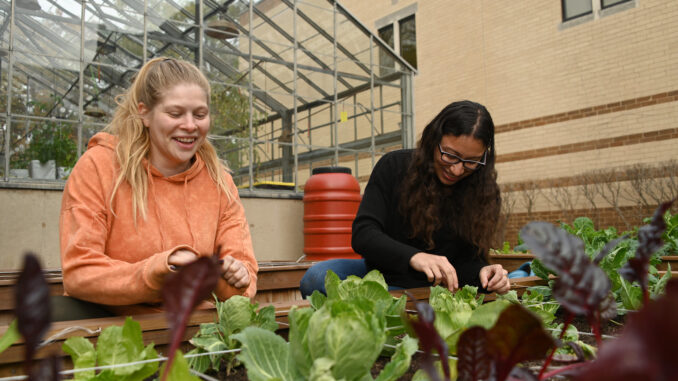
By Matthew Desmond
As college students of Generation Z, amidst homework, jobs, friends, family, and many other commitments, the environment seems to be just one more thing on our minds, and Dominican students are no exception. However, can you blame us? There’s no doubt that our generation has mixed feelings when it comes to climate change. According to an informal survey I conducted with responses from 10 students, half of them said that thinking of climate change makes them feel anxious, two said it made them feel angry, one said it made them feel sad, and two others said it made them feel some other emotion.
One reason for these feelings is because there is still a lot of work to do. According to the survey, six students said that they felt that Dominican is not doing enough to combat climate change. This is especially important, considering that college students will have to face the consequences of people’s actions in the future. Natalia Prato, a Faith Justice Waters Intern from University Ministry, expressed discontent with how leadership sometimes does not help citizens to solve the problem. She said, “I think we have the responsibility to make ethical individual choices, but I get frustrated when people who have the power to influence things don’t make a change.” Some people have the skills to create change, but do not exercise those abilities. Thankfully, Dominican has the tools in place to prepare students to combat this problem.
Dominican has ways for students to tackle climate change such as joining organizations such as SustainDU, an organization that “aims to organize activities to raise awareness and mobilize the campus culture around sustainability.” However, some students are unable to, or do not feel encouraged to participate, because they are either busy, are not aware of any of the activities due to the pandemic, or just chose to pursue different interests.
Another important factor Dominican has to consider is the educational perspective. Dominican pushes for sustainability efforts through education with its majors such as biology and environmental science, as well as with lessons about the environment being taught through the theme of the sophomore seminar: Life in the Natural World. Even with this fact, according to the survey, nine students said that they would like to see curriculum changes to promote sustainability. This change can be implemented in many ways. According to the survey, three students said that they were in favor of creating a sustainability minor; also, one student said they would like to see a sustainability concentration, and half of the students said that they would like to see a general promotion of sustainability in classes (for example, English classes reading books about sustainability; math classes with more problems about sustainability). These changes would either help students focus on sustainability or be able to see its importance even in a different field of study.
Not only can Dominican integrate sustainability through its educational programs, but change can also happen outside of the classroom. For example, seven students said that they would like to see this incorporation through University Ministry. This could happen through a Mass or a prayer service, alternative break immersions, or retreats dedicated to the environment. Another nine students said that they would prefer educational activities. These activities could be book clubs or movie clubs that discuss sustainability. Another seven students said that they would like to see career-oriented activities such as visits by environmental professionals who talk about how students can find work within the field of sustainability. Another nine students said they would prefer casual events such as festivals or even conversations about sustainability. There are many ways sustainability can be incorporated into events, clubs and organizations.
We have a long way to go in our struggle against climate change. We need to consider how we can change our lives, so we can sustain the Earth. However, Dominican University is a great place to start. When looking at the problem from an educational perspective, minors and concentrations in sustainability can teach students more about our environment and show them how to use their acquired skills to help the planet, even if they are not pursuing an environmental career. Outside the classroom, University Ministry can incorporate the environment into its liturgies and service opportunities. There can also be chances to look at sustainability through media, learn about its many careers, or even just gather and talk about the environment. If actions take place at the university level, those actions will inspire students to help make the Earth a more sustainable planet.



